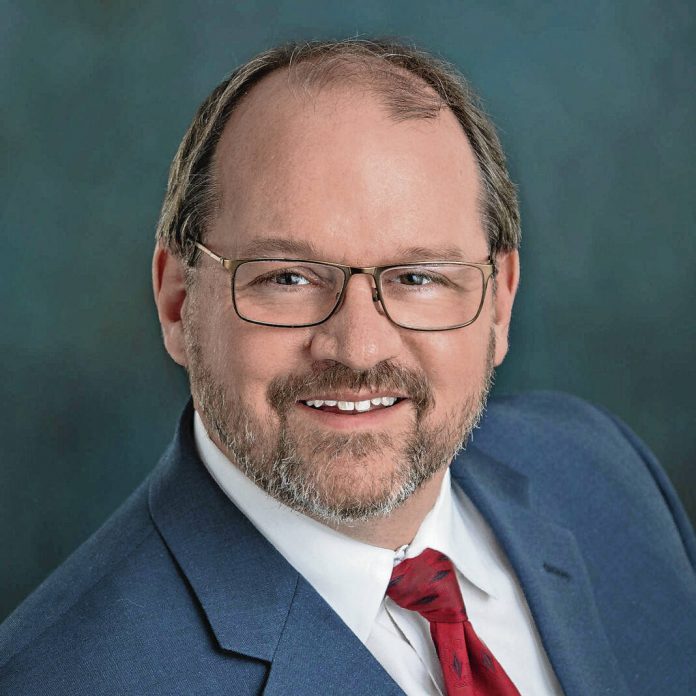
Steve Long, president and CEO of Hancock Health, said the key to improving the health status of people is prevention.
HANCOCK COUNTY — After agreement that the Hancock County community would benefit from enhanced funding for public health, Hancock County Commissioners decided to opt-in for Health First Indiana.
Passed in the 2023 legislative session, Health First Indiana is the state’s initiative that was created by Senate Enrolled Act 4 to help “ensure that every Hoosier has access to the core public health services that allow them to achieve their optimal health and well-being.”
According to the Indiana Department of Health, this funding would help provide for core services including lead screening, food protection, trauma and injury prevention and more.
Funding for the counties is distributed based on a sliding scale, dependent on how many counties opt-in. The minimum amount of funding for Hancock County in 2024 is $778,440 and the maximum amount is $1,037,920, with a county match of the average tax-levy related funds that were distributed to the local health department in the last three years.
State funding for 2025 could be as high as $2,075,840, with a maximum county match of $518,960.
If the county decided to opt-out, then it would receive the legacy amount from the Local Health Maintenance fund for $83,332.73, and the funds from Health First Indiana would be distributed to the other counties to use.
Dr. Gary Sharp, county health officer, shared that, to his knowledge, Hancock County currently gets nine dollars per person from the public health fund, but by opting-in with Health First Indiana, that amount jumps up to $20 in 2024 and $33 in 2025. Sharp told commissioners to note that the national average for public health funding is $91 per person.
“I think it’s important to note that [Gov. Holcomb] declared the centerpiece of this initiative to be that public health is best delivered locally as individual counties know the issues and needs of their citizens,” Sharp said. “With this in mind, he gave each county the option of opting-in or opting-out.”
As of Aug. 1 according to the county tracker on IDH website, 54 of the 92 counties already opted-in.
When a county opts-in, there are some funding requirements. According to Health First Indiana, at least 60% of the amount funded has to be spent on core services such as communicable disease prevention and control; student health; testing and counseling for HIV, HCV, STIs; referrals to clinical care and many more.
No more than 40% of the funding can be spent on services such as food protection; residential onsite sewage system permitting and inspections; sanitary inspection and surveys of public buildings and more.
And 10% of the amount can go toward capital expenses — purchase, construction or renovation of building or other structures; land acquisition; purchase of vehicles and other transportation equipment.
Counties are able to opt-in or opt-out in any fiscal year if they change their mind.
Sharp also mentioned that with the opt-in, their plan is to add services and team up with other agencies to help improve the county’s public health, and to keep and add staff by being more competitive with salaries.
Commissioner Gary McDaniel asked if more staff would be hired in order to implement the extra funding. Office manager for the Hancock County Health Department Crystal Baker said they wouldn’t have to, but would want to hire more people.
“We would want to because there is a lot of the core public services that right now, we don’t perform at the level we’d like to because of staffing,” Baker said. “There’s lots of opportunities and options out there and even a minimum of $778,00, there’s a lot of chance to do a lot of good.”
Steve Long, president and CEO of Hancock Health, attended the meeting and spoke to the commissioners on why he believed prevention is key, and that Indiana is ranked 48th in the country based on how much is spent on prevention.
“Invest in prevention, do the thing that’s going to make us better. And I’ll tell you, our goal at Hancock Health is to have Hancock County be the healthiest county in the state of Indiana,” Long said. “We want this to be the best county in the country to live, work, play and pray.”
Commissioner Bill Spalding said he remembers a quote from Benjamin Franklin that parents would use when he was a kid, “An ounce of prevention is worth a pound of cure.”
Commissioner John Jessup said he was in support as long as the county is able to opt-out at any point and is careful with what the county takes on.
With the information given, the commissioners passed a motion to opt-in for Health First Indiana.
Votes to opt-in and financial reports are due to IDOH by Sept. 3, and funds for 2024 should be available as soon as Jan. 1.
“I could not be more proud of our county today because this is a huge opportunity that they have seized,” Long said. “We now have the ability to invest in preventative measures that are going to increase the life expectancy and quality of the health of people in our county.”
For a full list of core services, breakdown of county funding or any questions in general about Health First Indiana, visit healthfirstindiana.com.




